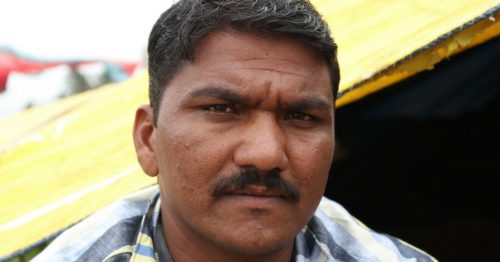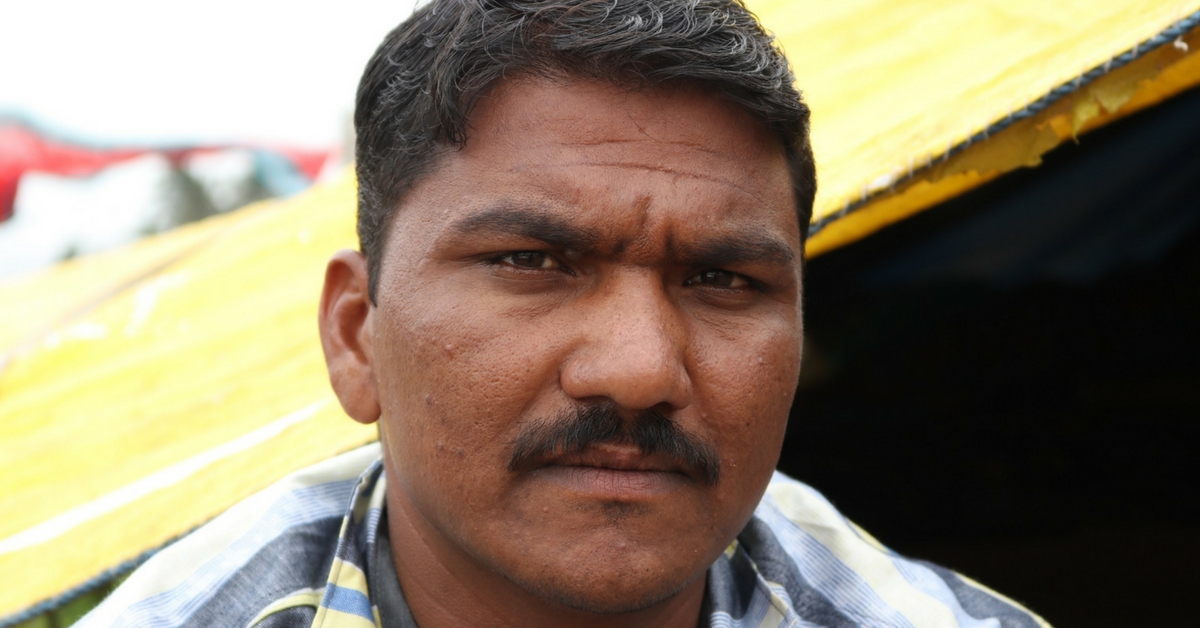“It all started when I couldn’t clear my grade ten examination,” says Vikas Burungle, 29, from a village called Dahivadi in the Satara district of Maharashtra.
Vikas is from the Nath Panthi Davari – a community of nomads. At 18, he left his home and started to wander around neighbouring villages in search of a livelihood, struggling to make ends meet.

“If you look at the history our community, along with several others, we have been migrating continuously and earn a bare minimum amount of money,” says Vikas, concerned about his future.
His troubles started when he had to quit his education because of his family’s poor financial condition. “I came to Gadhinglaj in the Kolhapur district of Maharashtra in 2004, and since then I’ve been on the lookout for an open space. Such spaces are usually where we setup our tents to stay, but this is always at the mercy of somebody else,” explains Vikas.
“The housing conditions are terrifying as rains destroy the tents completely and we have to spend days and nights in the rains without any shelter,” says 23-year-old Sambhaji, a relative of Vikas.
The people of Nath Panthi Davari Gosavi community have been categorized as nomadic tribes since members of the community are constantly migrating. “Independence hasn’t reached us, and we’ve been roaming around the country even after 70 years of Independence,” says Vikas.
Vikas repairs stoves across the countryside. A skill he learned from his father, who was illiterate, and travelled all over Maharashtra in search of work.
“Since, we travel continuously with no fixed place to stay, education always takes a back seat and this is how the vicious cycle of poverty continues,” says Vikas.
In order to find a permanent solution to this problem, Vikas decided that his family must settle down in Satara, and was firm about educating his children.
Remembering his grade ten days, he says, “Had my dad been educated, I would have never become a part of this ‘community’ business. Now, the only thing I can do to stop this is to educate my children.”
Vikas has three sons. The eldest son is in grade one, the second in kindergarten, and the youngest is two and a half years old. However, there are several obstacles in this path. He earns less than Rs 5500 every month – a meager amount of money that makes running his family and educating his children a difficult task.
Pained by his memories, he says, “There are a few good people who give us an open space to stay for a few months, while there are many others who completely ignore us and barely treat us like human beings.”
Vikas has stayed in a lot of villages in Maharashtra owing to his search for work. So far, he has been to Gargoti, Ajra, Ichalkaranji, Kagal, Gadhinglaj and Admapur.
His day starts at 07:00 AM, by carrying a box full of equipment on his old bike and traveling around neighbouring villages. “Now, since the usage of kerosene has stopped, the number of people using stoves has also come down. This has severely affected our services. So now, I am looking for a different job which will help me settle down in Satara,” he adds.
You may also like: Meet 17-Yr-Old Faseela, the First Doctor From This Kerala Fishermen’s Community
Vikas is convinced that nobody will fight for him and it’s only his perseverance and determination that can bring about a change- no matter how small. “I’ll give my children whatever they want, but they should keep learning, and never forget the struggle their ancestors had to go through. I won’t let my children suffer and for this I am ready to work more than I can, but this practice of continuous migration will have to stop somewhere.”
Vikas, who cannot avail the benefits of reservation either, says, “My documents aren’t clear and this community barely knows about reservation. Whenever I go to a Government office, the first question they ask is about the registration of my name in any Panchayat across Maharashtra. Since, we keep travelling, there’s no village we belong to and so my name is not found in any Panchayat, which completely discards my application for reservation.”
While the problems are many and the well-off not very helpful, Vikas is channelizing his struggle with the golden step of educating his children!
By Sanket Jain
Like this story? Or have something to share?
Write to us: contact@thebetterindia.com
Connect with us on Facebook and Twitter.
NEW: Click here to get positive news on WhatsApp!
If you found our stories insightful, informative, or even just enjoyable, we invite you to consider making a voluntary payment to support the work we do at The Better India. Your contribution helps us continue producing quality content that educates, inspires, and drives positive change.
Choose one of the payment options below for your contribution-
By paying for the stories you value, you directly contribute to sustaining our efforts focused on making a difference in the world. Together, let's ensure that impactful stories continue to be told and shared, enriching lives and communities alike.
Thank you for your support. Here are some frequently asked questions you might find helpful to know why you are contributing?

